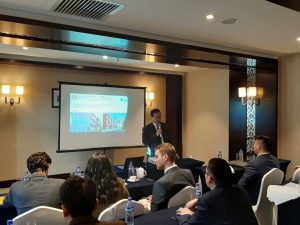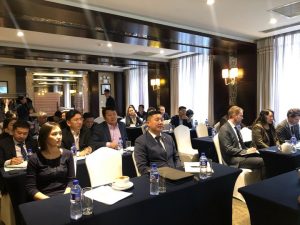 December 5, 2019; Ulaanbaatar, Mongolia — Today, the Global Green Growth Institute (GGGI) Mongolia, together with the Ulaanbaatar city Mayor’s Office, organized a stakeholder consultation workshop on GGGI’s Residential Retrofitting project.
December 5, 2019; Ulaanbaatar, Mongolia — Today, the Global Green Growth Institute (GGGI) Mongolia, together with the Ulaanbaatar city Mayor’s Office, organized a stakeholder consultation workshop on GGGI’s Residential Retrofitting project.
The workshop aimed to establish a project working group to present the project’s work plan and findings of consultant services, and to receive feedback from stakeholders.
Mr. T. Gantumur, General Manager of Ulaanbaatar and Head of the Mayor’s Office, delivered the opening speech, in which he highlighted GGGI’s great contribution to the progress of Residential Retrofitting project for the greening of heating technologies at public educational buildings.
The main discussion points of the workshop were as follows:
– Residential Retrofitting-Work plan for 2020;
– Estimation of building energy savings; and
– Potential ways to monetize saved heating
 Mr. Romain Brillie, GGGI’s Mongolia Country Representative, emphasized in his opening speech that most of the project’s important activities are still ahead of us, because we need to submit DPP to NAMA Facility with clear and accurate data and baselines by the end of 2020. The Residential Retrofitting project is being prepared and implemented in association with ICLEI East Asia Secretariat (ICLEI EAS), the World Resources Institute (WRI), GIZ, and Ulaanbaatar city.
Mr. Romain Brillie, GGGI’s Mongolia Country Representative, emphasized in his opening speech that most of the project’s important activities are still ahead of us, because we need to submit DPP to NAMA Facility with clear and accurate data and baselines by the end of 2020. The Residential Retrofitting project is being prepared and implemented in association with ICLEI East Asia Secretariat (ICLEI EAS), the World Resources Institute (WRI), GIZ, and Ulaanbaatar city.
Background:
The BEA, ICLEI East Asia Secretariat (ICLEI EAS), and the Global Green Growth Institute (GGGI) have been supporting the Mayor’s Office to achieve its residential energy efficiency targets, as well as to contribute towards national goals. In cooperation with the Mayor’s Office, ICLEI EAS, and GGGI have developed an initial business model design and innovative financing mechanisms for thermo-technical retrofitting of the residential buildings in Ulaanbaatar city.
In September 2016, Mongolia ratified its Intended Nationally Determined Contributions (INDCs) to the Paris Agreement on Climate Change in accordance with key national mandates and sectoral policies such as the Green Development Policy (2014) and its Action Plan (2016). Mongolia’s overall commitment is to reduce 14% of greenhouse gas emissions (GHG) by 2030 compared to Business-As-Usual (BAU). One of the main drivers to achieve this goal is to improve energy efficiency in production, distribution, transmission, and usage.
The Government of Mongolia set out ambitious targets and goals to improve energy efficiency, conservation of energy and reduce energy losses. Among which, Mongolia’s Green Development Policy and INDC document set out a goal to reduce building heat loss by 40% by 2030. Although there have been a number of legal and regulatory improvements to achieve energy efficiency potential in Mongolia, there is a gap in terms of residential buildings. In aggregate terms this sector represents 40% of energy consumption, more than industry and transport sectors combined. The residential building sector thus has greater potential to reduce energy demand and ultimately to reduce CO2 emissions.
Ulaanbaatar City has the highest number of building stock in Mongolia. According to Mayor’s Office, there are 1077 pre-fabricated buildings in UB city which have high building heat loss. Mayor’s office has developed sub-program to carry out thermal-technical retrofits for these buildings, starting with 375 buildings that have passed the earthquake resilience test.
About the Global Green Growth Institute (GGGI)
Based in Seoul, GGGI is an intergovernmental organization that supports developing country governments transition to a model of economic growth that is environmentally sustainable and socially inclusive. GGGI delivers programs in 25 partner countries with technical support, capacity building, policy planning & implementation, and by helping to build a pipeline of bankable green investment projects. More on GGGI’s events, projects and publications can be found on www.gggi.org. You can also follow GGGI on Twitter and join us on Facebook, YouTube and LinkedIn.
About ICLEI
ICLEI – Local Governments for Sustainability is the leading global network of over 1500 cities, towns and regions committed to building a sustainable future. By supporting cities to become sustainable, low-carbon, resilient, ecomobile, biodiverse, resource-efficient; to build a smart infrastructure; and to develop an inclusive, green urban economy with the ultimate aim of achieving healthy and happy communities, ICLEI impacts 25% of the global urban population. Based in Seoul, South Korea, ICLEI East Asia was founded in 2012 to support Members in the region to achieve urban sustainability through ICLEI’s 5 Pathways. For more information please visit eastasia.iclei.org.
About WRI
WRI is a global research organization working at the intersection of environment, economic prosperity, and human well-being. The Building Efficiency Accelerator partnership is coordinated by the WRI Ross Center for Sustainable Cities.
About BEA
The SE4ALL Building Energy Efficiency Accelerator (BEA) assists sub-national governments to improve the energy efficiency of buildings in their jurisdictions to reduce energy costs, create new market opportunities and reduce pollution. In 2018-2019, the global program will assist 60 subnational partners and leverage the expertise of over 40 technical organizations and business partners. This multi-sectoral collaboration aims to speed actions on efficiency policies and projects. The BEA partners have selected 8 BEA cities for deeper partnership in 2018-2019, including Ulaanbaatar, Mongolia. The deep support to Ulaanbaatar includes the provision of on-site staffing and expertise from ICLEI – Local Governments for Sustainability (ICLEI) to assist the city in planning and implementing building efficiency actions.